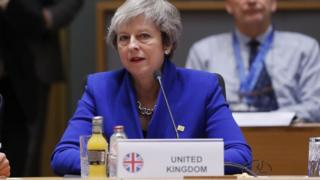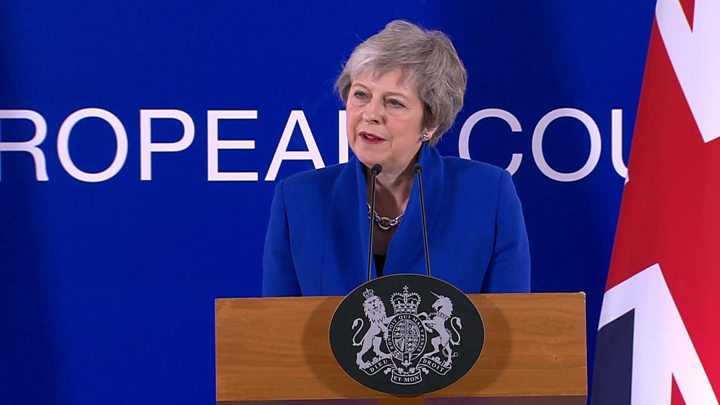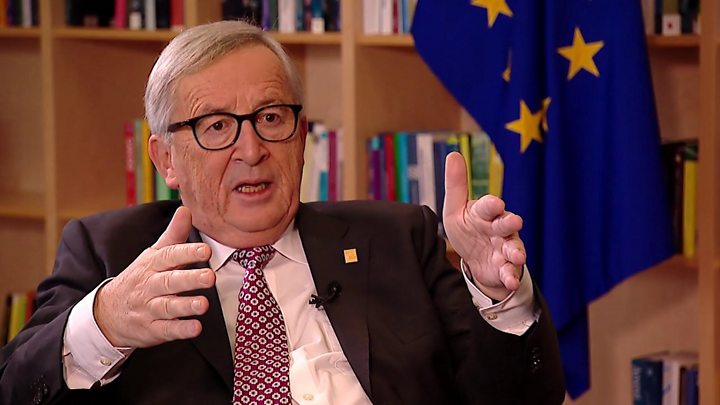Brexit: Back my deal or risk more division, May to tell MPs
 Image copyright
EPA
Image copyright
EPA
Rejecting the Brexit deal will be risky and lead to "division and uncertainty", Prime Minister Theresa May will say to MPs who oppose her plan.
Her Commons speech comes after the 27 other EU leaders approved the terms of the UK's exit at a summit on Sunday.
Mrs May now has to persuade politicians in the UK Parliament to back the deal.
But cabinet ministers admit she faces an uphill struggle, with Labour, the Lib Dems, the SNP, the DUP and many Tory MPs set to vote against it.
The DUP has said it will review their parliamentary pact with the Conservatives, which is effectively keeping Mrs May in power, if the deal is approved by MPs.
And Labour leader Jeremy Corbyn said his party would oppose it, calling it "the worst of all worlds".
The prime minister has pledged to put her "heart and soul" into a two-week push to convince MPs to back the terms of the UK's withdrawal from the EU and its future relations with the bloc.
Parliament will decide whether to accept or reject the package next month, in a vote which is likely to be on 12 December.

Her campaign - which saw her appeal to the public in a "letter to the nation" at the weekend - could also include a TV debate with Mr Corbyn, the Daily Telegraph has reported.
The newspaper said Mrs May - who refused to take part in a head-to-head debate with the Labour leader before the 2017 election - will challenge Mr Corbyn. Labour says he would "relish" a debate.
Meanwhile, analysis commissioned by the People's Vote campaign - which wants another referendum on Brexit - claimed the deal would leave the UK £100bn a year worse off by 2030.
'Back to square one'
In her Commons statement on Monday, expected to begin at about 15:30 GMT, Mrs May will say that backing the deal would bring an end to the uncertainty surrounding Brexit.
"Our duty as a Parliament over these coming weeks is to examine this deal in detail, to debate it respectfully, to listen to our constituents and decide what is in our national interest," she will say.
She will tell MPs to choose whether they want to back the deal and "move on to building a brighter future of opportunity" or reject it and "go back to square one".
"The British people want us to get on with a deal that honours the referendum", she will add.
The prime minister, who will chair a meeting of her cabinet on Monday morning, will say she is "absolutely" sure there is no better deal on offer.
Her fellow EU leaders made it "very clear" there would be no further negotiations if the deal is rejected, she is expected to add.
On Sunday, Jean-Claude Juncker, the head of the European Commission, said anyone in Britain who thought the EU might offer better terms would be "disappointed" because this was the "only" deal.

But critics in Mrs May's own party - such as MP Marcus Fysh - dispute the argument, saying the PM has capitulated on key issues and the EU would be willing to give ground to avoid a no-deal exit.
Analysis: 'No 10's carefully designed script'
By BBC political editor Laura Kuenssberg
No 10 is all too aware it is waging this campaign for its compromise against a wall of resistance.
There are doubts about elements of the deal inside cabinet, and the Tory backbenches are riddled with concerns.
The opposition parties and her supposed partners in government - the DUP - are all, so far, set against.
But the Prime Minister's chosen - and perhaps only realistic - political option at this moment is to keep pushing on with a deal that she believes allows us to leave the European Union without hurting the economy while putting the UK in charge of its own immigration policy.
There's irritation in government about the French President's warning over the long-term control of fishing rights.
Noises off from other EU leaders who tried in the main to show a helpful face in Brussels yesterday are not part of Number 10's carefully designed script.
The leaders of the remaining 27 EU countries have made clear they still hope to negotiate fishing access in UK waters based on existing rights.
At the EU summit, French President Emmanuel Macron warned that if, in future talks, the UK is unwilling to make compromises over fishing, the negotiations for a wider trade deal could be slowed down, which could potentially lead to the last-resort backstop plan coming into force.
Also on Sunday, Foreign Secretary Jeremy Hunt insisted Mrs May could "absolutely" carry on as PM - even if the deal was voted down. But he said "nothing could be ruled out" - potentially including the government collapsing and calls for a general election or another referendum.
Meanwhile, ex-Foreign Secretary Boris Johnson - who quit his job over Mrs May's Brexit plan - called her deal a "humiliation" for the UK in his regular column in the Daily Telegraph.
The UK is bound by law to leave the EU on 29 March 2019, whether the deal is sanctioned or not.
EU leaders approved two key Brexit documents at the summit: the 599-page, legally-binding withdrawal agreement which sets out the terms of the UK's exit, and also the political declaration which sets out what the future UK-EU relationship might be like.
If the agreement passes through the UK Parliament, it needs to go back to the European Council for a vote and then be ratified by the European Parliament.
